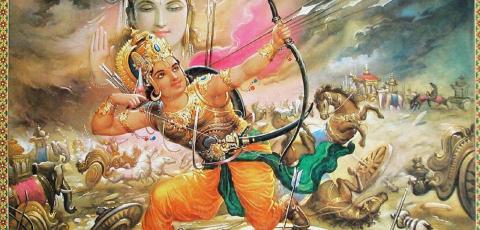
Dharmarāja offered tarpaṇa to Bhīṣma and as he neared the shores of Ganga, he collapsed out of sorrow. Dhṛtarāṣṭra, Kṛṣṇa, Vyāsa and everyone else present there consoled him and got him back to his senses. Dhṛtarāṣṭra said – “Get up, Yudhiṣṭhira! Take care of the things that you need to hereafter. Rule the kingdom that you have won over as per the dharma of the Kṣatriyas! It is only Gāndhārī and I who will need to lament at this juncture. The...
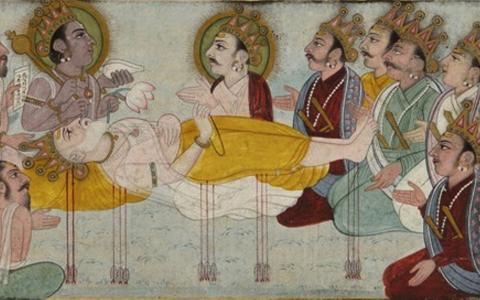
Yudhiṣṭhira said, “However competent one might be, if destiny doesn’t smile on him, he will not earn any wealth. Even a helpless chap or a child, if favoured by fortune, earns a great deal of wealth. There are hundreds of people who have gained nothing even after great attempts and tribulations; there are also several people who have become wealthy without even trying. Similarly, those who tread the wicked path are living in comfort while the...

Although Bhīṣma spoke many such words of peace and solace, Dharmarāja’s heart would not find peace; he would not be consoled. He lamented with the words – “Having done the most heinous of crimes with my own hands how will I now get peace just by wishing for it? When I look at your body, pierced with arrows, and blood oozing out from myriad wounds, my mind doesn’t have a moment of peace. It is because of me that you are consigned to this fate; it...
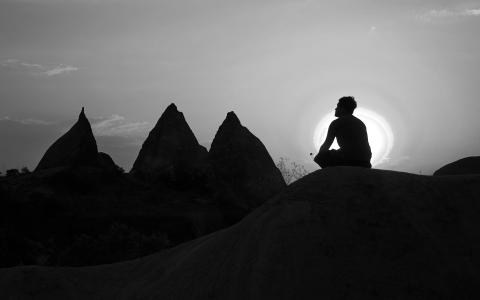
Yudhiṣṭhira – Are there any instances in the past when a king attained siddhi, the ultimate accomplishment, even as he was a householder? And if so, what is the nature of the mokṣa that he attained? Kindly tell me, O grandfather!
Bhīṣma – Several years ago, there was a king named Janaka who was hailed as a dharma-dhvaja [in this context, it is possibly used in a positive sense, as ‘uplholder of dharma’ (literally, ‘dharma-banner’) but normally...

Yudhiṣṭhira asked, “How did this universe, with animate and inanimate, get created? When it dissolves, where does it go?”
Bhīṣma (Relating the discussion between Manu and Bṛhaspati) – From akṣara (the indesctructible) comes ākāśa (sky); from that comes wind; from that, fire; from that water; from that comes the world – this is the order of sṛṣṭi, creation. During pralaya, dissolution, the world returns to water, which returns to fire; fire...
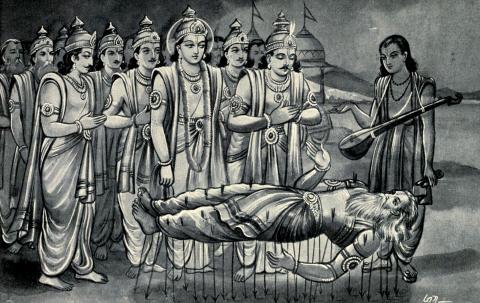
In the past, Kāśyapa, the son of a certain riṣi was run over by a chariot that belonged to a vaiśya. The chariot hit him and Kāśyapa fell down. He was greatly pained because of the incident.
He thought – ‘What is the use of this helpless life? I’ll die right away, right at this spot!’. He greatly lamented for the troubles that had come his way.
Indra, who saw the state in which Kāśyapa was, came down to the earth in the guise of a...
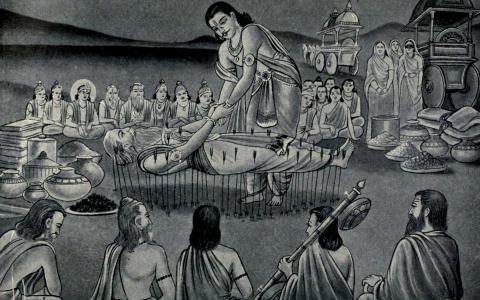
Yudhiṣṭhira: As time passes by and all creatures are taken to the abode of death, which is the conduct that leads to śreyas (goodness)?
Bhīṣma: (What Mādhavī told her father) – What one knows to be good, he must do it at once. Or else, Death comes in the way. What one plans to do in the afternoon, one must do it in the morning. Death doesn't observe if one has done something or is yet to do something. Therefore, one must adhere to dharma and...

The fox said, “A golden child! Listening to the words of this eagle, you’re on the verge of leaving this boy here and going away! Will love and sorrow go away just because you leave? If you abandon him here, later you will definitely feel terrible. Long time ago, Śrīrāma killed Śambhuka and brought a brāhmaṇa boy to life, haven’t you heard? And a dhārmika brought Śvetarāja’s son back to life, don’t you know? Similarly, some siddha or muni or...

During times of adversity, if one doesn’t despair and stands firm with determination – and added to that if he received divine grace, the adversity soon passes and he is rewarded. Long back, in Vaidiśa-nagara, a boy had died. His relatives were overcome by grief, for he was the only son in the family [who had to take forward the lineage]; drowned thus in sorrow, they took the corpse to the cemetary, placed it on their laps and wept bitterly. An...

I will narrate another story to demonstrate how an enemy should never be trusted even if he appears to be soft and is gentle in his speech. There lived a king by name Brahmadatta in the city of Kāmpilya. A bird by name Pūjini had built its nest in his palace and had lived there for a long time. The queen gave birth to a son and on the same day the bird too had an offspring. The bird brought fruits from the sea shore and fed the royal child and...
